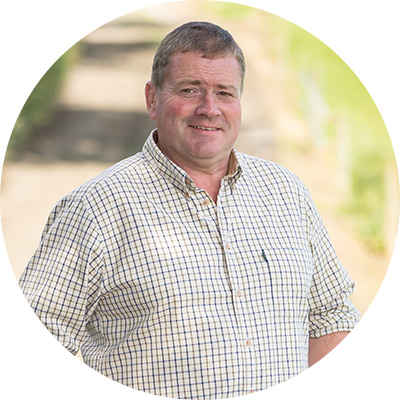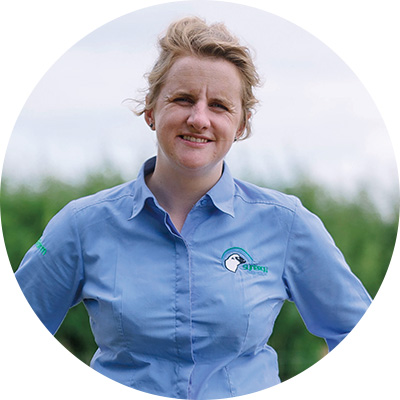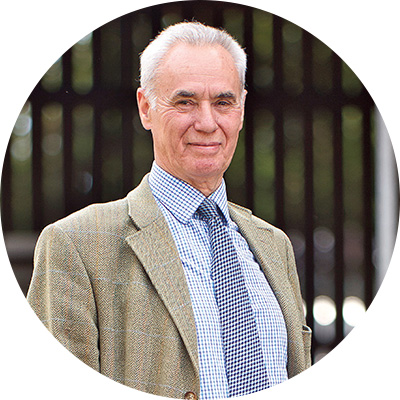2019 Farmers Weekly Awards: Livestock Adviser of the Year finalists
Top-quality independent advice that meets the needs of the farmer – while optimising returns from the farm business – were a key attribute of all three finalists in a closely contested awards category.
See also: Meet the 2019 Farmers Weekly Awards finalists
The 2019 Livestock Adviser of the Year finalists:
- Trevor Alcorn, College of Agriculture Food and Rural Enterprise – Knowledge Advisory Service, County Tyrone
- Emily Gascoigne, Synergy Farm Health, Dorset
- Charles Mayson, CXCS, Herefordshire
The judges:
- Oliver Hodgkinson; last year’s winner
- Johann Tasker, Farmers Weekly chief reporter
- John Royle, NFU chief livestock adviser
Trevor Alcorn
 College of Agriculture Food and Rural Enterprise – Knowledge Advisory Service, County Tyrone
College of Agriculture Food and Rural Enterprise – Knowledge Advisory Service, County Tyrone
Dairy development adviser Trevor Alcorn works with 80 family farms in Northern Ireland – helping them to optimise returns with a strong focus on meeting personal goals while improving business performance.
Much of his work has been on a one-to-one basis with farmers in farmyards across counties Tyrone and Fermanagh. But since the introduction of business development groups in 2016, he spends more time encouraging farmers to meet in groups.
Group size ranges from 15-25 farmers. They meet a minimum of eight times a year to discuss a range of topics, which include grazing management, silage production, weed control, herd health and fertility, nutrition and physical and financial benchmarking.
Sharing knowledge
“I firmly believe farmers learn better from each other – or by actually seeing something done rather than being told what to do,” says Trevor, whose clients include new entrants into the industry as well as family farmers with years of experience.
“I am always encouraged when back on farm again to see some of my suggestions have been implemented. But I always like to see the farmer putting their own slant on it as well, because it means they are adapting my advice to suit their own specific needs.”
One early group meeting involved bringing in a local vet and having a discussion and practical demonstration about selective dry cow therapy (SDCT) and the use of teat sealants. At this stage, all group members were routinely using antibiotic tubes at drying-off.
Within 18 months, some 14 farmers out of the 18 present at the meeting had reduced their antibiotics use and were successfully practising SDCT – and were exchanging information about the benefits it had brought their businesses.
Milk from grass
Teasing out each farmer’s goals brings dividends. Strabane dairy farmer Albert O’Neill, who farms at Artigarvan, improved his milk from forage by 600 litres a cow – equivalent to £67 an animal or £13,000 across the herd – by heeding Trevor’s advice.
“I was sceptical at first with the discussion groups, but you learn so much from other people – including their mistakes and yours,” says Albert, who improved his grassland strategy using a plate meter to measure grass growth, pre-mowing and developing his own seed mixes.
Being born and bred on a family dairy farm himself, Trevor’s background as a milk producer gives him an innate understanding of what makes farmers tick, says Albert. So too does his expertise in dairy building design and management.
Focus on farmers
Trevor was a key member of the design team that produced plans for a £2.5m state-of-the-art, 200-cow dairy centre at Greenmount Campus Antrim. While few farms could justify spending so much on new buildings, many of its features can be individually implemented at farm level.
But it is people, not just cows, that are among Trevor’s key interests. Acknowledging that he is only one person in a much wider team, he says his biggest achievement was being awarded a 2015 Nuffield scholarship to investigate the future of family dairy farming.
“In a nutshell, my conclusion was that there is a future for some family dairy farms,” he says. “But they must communicate, collaborate and innovate to help ensure their survival. That is exactly what we are trying to do with our discussion groups.”
What the judges say:
Trevor shows that knowledge exchange programmes can deliver real benefits for farmers when they are facilitated by the right people with the right expertise and a passion for the industry.”
Summary
The judges liked
• Possesses deep understanding of farming systems
• Cares about client farms as if they are his own
• Successfully encourages openness among farmers
• Promotes benchmarking to improve performance
• Focuses on what is best for farmer, not just farm
Business facts
• Knowledge exchange through discussion groups
• Physical and financial benchmarking of farms
• Building design and farm development plans
• Succession planning and local social events
• Nutrient management planning and advice
The numbers
• 80 farmers in four discussion groups
• 125 Average herd size (approx)
• 54 clients now benchmark their business
• £67 a cow saving by increasing forage
• 7 countries visited during Nuffield study
Emily Gascoigne
 Synergy Farm Health, Dorset
Synergy Farm Health, Dorset
Emily Gascoigne has been passionate about sheep for as long as she can remember – and certainly since starting her own flock of Herbridean sheep as a teenager.
Today, she is one of the top sheep vets in the country, adding value to commercial flocks across south-west England.
During her seven years with Synergy Farm Health, Emily has built up an enviable client base, ranging from large breeding and finishing flocks to store units and pedigree enterprises.
Her job includes proactive health planning, as well as emergency work – always with a focus on the physical and financial performance of the flocks she looks after.
Lamb losses
The role of a good vet goes way beyond animal health products and medicines, she explains. “Lamb mortality and losses are something I am really interested in – and the idea of minimising that lost potential within the sheep flock.”
Keen to share her knowledge with her clients, Emily offers annual training to farmers so they can perform their own neonatal lamb post-mortems – increasing the understanding of her clients at lambing time to help them reduce lamb mortality.
A key feature of her flock health planning includes a lamb cost calculator, demonstrating the cost of losses to sheep farms based on their own figures. This shows that some 72% of all variable costs are incurred prior to lambing – amounting to up to £25.62 a scanned lowland ewe.
“I am comfortable talking to my own clients in terms of costs and impact of disease – and encouraging them to critique their own decision-making. How many lambs does an hour of flock health planning have to save? Not many.”
Business growth
Synergy Farm Health had 285 sheep flocks on its books when Emily joined the practice in 2012. Today, that number has increased to more than 400 holdings – with more farmers employing her services every year.
Many clients have welcomed her focus on anonymous benchmarking, which has helped them raise their business performance. “It quickly became evident that there was a demand within the practice for proactive sheep work and my diary started to become increasingly busy,” she says.
First-generation farmers Rob and Anna Hawke, who run a flock of 1,000 Romney ewes at Bishopstone, near Salisbury, have increased their flock’s eight-week weight by 4kg since Emily started advising them on how they might get more from their business.
“We were looking for a vet with a long-term approach rather than a fire brigade service,” explains Rob. “Emily came recommended. Like most farmers, we wanted to see a return on our veterinary investment and saw that Emily’s expertise would achieve that.”
Practical results
Discussion groups initiated by Emily form a key way of sharing knowledge between producers. A large flock discussion group for producers initially attracted just two attendees. But it soon expanded to 10 members and now goes on tour annually, visiting farms by minibus.
“An ongoing dialogue is a hugely important part of flock health planning. My commercial flocks have my mobile number and email address, which brings our working relationship more akin to consultancy rather than the traditional relationship.”
Going the extra mile like this means the service offered continues even after Emily leaves the farm – and it is clear Emily lives, breathes and sleeps her job.
“Fundamentally, I really love sheep – and that is the bottom line,” she says.
What the judges say
Emily’s dedication has cemented her reputation as a sheep vet within what is primarily a dairy-based veterinary practice, delivering value for money to farmers as well as the practice itself.”
Summary
The judges liked
• Good communicator, with infectious enthusiasm
• Focus on benchmarking and how client’s business performs
• Presents data to farmers in a way that encourages them to use it
• Making improvements even for top-performing clients
• Demonstrates her worth to farmers and veterinary practice
Business facts
• Flock health advisory services to sheep farmers
• Farmer, vet and student training and research
• Covers Dorset, Somerset, Devon and beyond
• Antibiotics use 32% lower than industry average
• Consultancy clients have 24/7 veterinary access
The numbers
• 350% increase in farmers attending training
• 34 specialist farm animal vets in the practice
• 5 SQPs working within dispensary team
• 50,000 breeding ewes across 400 holdings
• 7 years experience with Synergy Farm Health
Charles Mayson
 CXCS, Herefordshire
CXCS, Herefordshire
Charles Mayson started his business with a notebook and an idea: to help livestock farmers through farm inspections while taking care of all associated paperwork. A decade on, he has 21 employees and 1,250 farmer-clients across the country.
With a particular focus on dairy producers, clients are advised across four main areas – cross-compliance, basic payments, farm assurance, and health and safety. About 150 new customers are gained every year.
“We’re not general consultants working across a vast range of topics – we have identified a niche and focus exclusively on that,” says Charles. “To the best of my knowledge, we are the only advisers who do it in this specific field.”
Specialist service
Before launching Cross Compliance Solutions (CXCS), Charles ran his own fertiliser business – and was acutely aware that the proliferation of paperwork and legislation would only multiply.
Sensing an opportunity, he asked one of his fertiliser customers if he would let him complete his nitrate vulnerable zone paperwork.
“That farmer is still a client and a friend today,” says Charles.
Much of the focus is on nutrient management – including manure loading, soil erosion risk and fertiliser applications. Ensuring clients are regulation-compliant and operating within limits is fundamental to the service, explains Charles.
Farmers receive an A4 lever-arch folder containing all relevant information. In the event they are inspected, the farmer can simply hand it over to the inspector, safe in the knowledge that it contains everything they need.
Six-monthly MOT
“This is not information that is secret or clever – it is a matter of digging it out on behalf of the farmer and putting it in one place,” says Charles. “We support clients through the inspection process – guaranteeing that their cross-compliance paperwork will pass.”
Dairy farmer Fred Simcock, who milks 600 cows across 400ha at Woofields Farm, Coddington, near Ledbury, says his annual fertiliser bill has halved since employing Charles’ services. His records – which are updated twice a year – are like a six-monthly MOT, he adds.
“We needed someone to detail what we actually do on the farm,” explains Fred. “We are here to farm profitably, not to fill in paperwork. Having someone to look after that side of things makes you feel so much safer – and lets you concentrate on the day job.”
Fred believes Charles has saved him tens of thousands of pounds – as well as making sure that his business operates within the rules and regulations – including those overseen by the Rural Payments Agency and the Environment Agency.
Steady growth
What began as a one-man band, operating from Charles’ house, is now a business with a significant turnover and forensic focus on customer care, a reputation for giving 100% accurate advice and clients across the country.
“My nightmare scenario would be an inspector finding fault with a farm and my client having a ringside seat, watching everything unravel as the inspection takes place.” he says. “That is why we are so careful to get things right.”
The past three years have seen a particularly strong evolution of the business. This includes the introduction of a farm safety service to help reduce the industry’s high workplace accident rate, a move to new offices and investment in people development.
“If there is one thing I have learned from my farmer-clients, it is that a business that achieves continual, steady growth is stronger than one that fluctuates wildly in its fortunes,” says Charles. “That is why my approach is to offer a unique service of incomparably high quality.”
What the judges say:
Charles has created an exceptional business doing a job most farmers hate – dealing with mountains of paperwork to ensure his clients are on top of their cross-compliance obligations.”
Summary
The judges liked
• Spotted a niche in the market doing a job farmers dislike
• Strong focus on nutrient management – saving clients money
• Provides peace of mind for livestock farming clients
• Values importance of face-to-face meetings
• Sole role is to assist, represent and protect the farmer
Business facts
• Offers bespoke service to clients
• Continues to expand client base across all farm sizes
• Values staff welfare and professional development
• Not afraid of delivering tough messages to clients
• Strong business growth over past three years
The numbers
• 1,250 clients across England
• 7% growth in client base during 2018
• 21 skilled and dedicated employees
• 123% annual growth in health and safety service
• 10 staff members visiting client farms
Sponsor: Kubota
 “Kubota are proud to sponsor the Livestock Adviser category of the 2019 Farmers Weekly Awards, recognising the hard work, innovation and dedication taking place up and down the country.”
“Kubota are proud to sponsor the Livestock Adviser category of the 2019 Farmers Weekly Awards, recognising the hard work, innovation and dedication taking place up and down the country.”
Rob Edwards, business development manager, agriculture, Kubota UK
